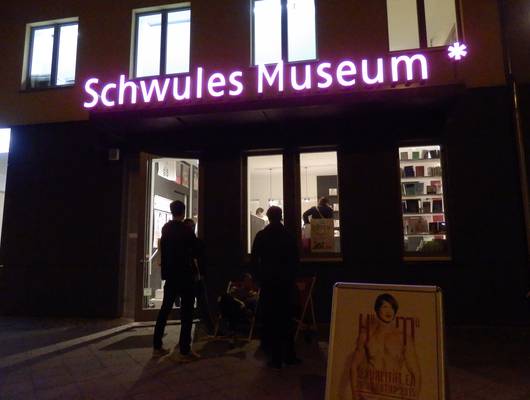
Photo: courtesy Schwules Museum
Unidentified assailants have fired shots at the glass windows of the Schwules Museum (Gay Museum) in Berlin.
At around 2 p.m. on Monday, staff members noticed damage to the window and alerted local police, the Berliner Zeitung reports. A police spokesperson told the press that projectiles were found on the ground in front of the building, stating that “the current findings suggest small bullets.” It is unclear, however, what weapon had been used to fire the shots. As the bullets didn’t puncture through the window, investigators are looking into the possibility of it being an air gun.
As it cannot be ruled out that the crime might be motivated by homophobia, the investigation has been taken over by the police department for state security, who are tasked with combating “politically motivated crimes.” (Since the German Criminal Code does not have hate crime legislation, a homophobic motif will be considered “political”). The museum did not comment on the events at the time of reporting.
Berlin’s Schwules Museum was founded in 1985 and moved into its current location in 2013. The state-funded museum has grown to become one of the leading institutions for archiving, researching, and communicating the history and culture of LGBTIQ communities. Other museums around the world, including the U.S. Holocaust Memorial Museum in Washington, D.C., seek their expertise, said Wolfgang Theis, curator and co-founder of the Schwules Museum, talking to NPR.
The museum’s archive is also central to Holocaust research.
Photo: Courtesy Schwules Museum.
The museum has recently marked its 30th anniversary with a celebratory show, on view through May 12, re-examining objects in the museum’s collection. The show includes a portrait of Lenin, who decriminalized homosexuality in Soviet Russia in 1922. It didn’t take long before it had become a criminal offense again, under Stalin.
There’s also a picture of former conservative chancellor Helmut Kohl. Ironically, in the wake of German re-unification, it was Kohl who eliminated Germany’s paragraph 175, which had been used to punish gays in Germany for over 120 years. East Germany had already abolished the criminalization of gay and lesbian sex in the late 1980s.
“A pair of elegant leather shoes are displayed at the entrance to the show in honor of Charlotte von Mahlsdorf, a fellow museum founder and a prominent transvestite,” Theis told NPR. Under von Mahlsdorf’s directorship, the museum used to be the center of East Berlin’s homosexual scene.